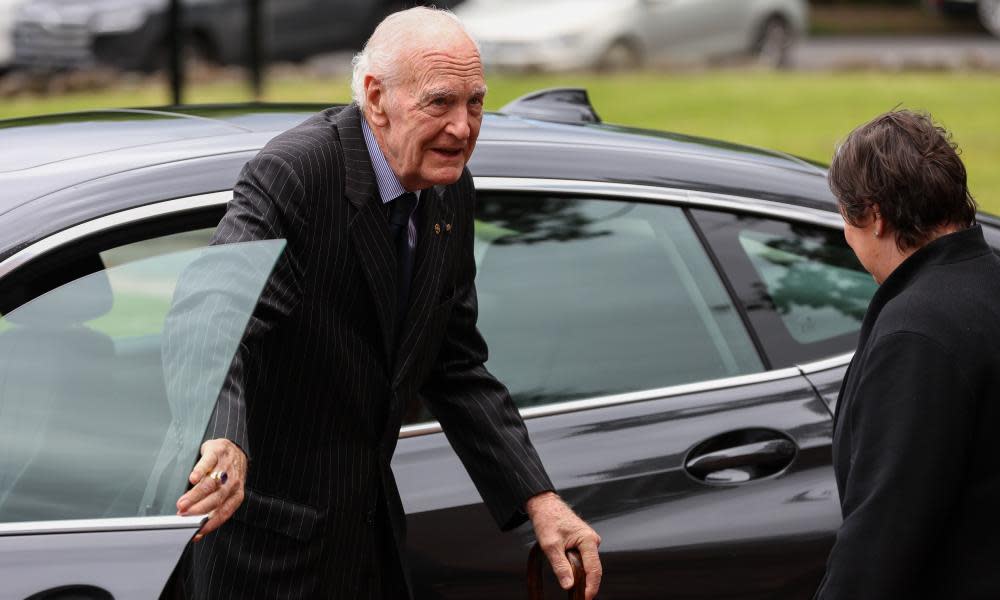Peter Hollingworth hearing: complainant says secrecy ‘only serves to re-enforce harm’

An abuse survivor told a hearing to potentially defrock former Anglican archbishop and former Australian governor general Peter Hollingworth that the secrecy around the hearing “only serves to re-enforce the profound harm” to victims.
Hollingworth has been the subject of complaints over his handling of abuse cases in the Anglican church while archbishop of Brisbane, a role he held for 11 years before becoming Australia’s 23rd governor general.
The current hearing – conducted under Kooyoora, which handles complaints against Anglican clergy – is due to end on Thursday, the Guardian understands, more than five years after complaints were first lodged.
The hearing has been held in private, and basic details have been kept from complainants, who are furious at the continued delays and secrecy.
Complainant Beth Heinrich made an intervention during the hearing in an attempt to force Kooyoora to make it open to the public. Her submissions show Heinrich, represented by Judy Courtin Legal, argued that the need for an open hearing was “grounded in the democratic ideals of transparency and accountability underpinning our justice system”.
“The very nature of institutional sexual offending against children has always been shrouded in secrecy,” Heinrich’s team argued to the tribunal. “The concerns our client expressed … above, only serves to re-enforce the profound harm suffered by victims of such childhood trauma.”
Heinrich was allowed to attend the hearing to give her own statement and listen to the submissions of other parties on Tuesday.
But otherwise the hearing has remained closed to her and she has been denied simple information, including when the hearing will end.
Heinrich told Guardian Australia on Wednesday that the secrecy around the hearing was “ridiculous”. She said it further undermined her own faith in the process.
“It just makes me really, really angry,” she said. “I just think it’s absolutely ridiculous.”
Hollingworth is not accused of any abuse towards children, but has faced widespread criticism for his handling of complaints while in a leadership role within the church.
The child abuse royal commission found that Hollingworth, as archbishop of Brisbane in 1993, failed to act to remove a lay preacher, John Linton Elliot, despite Elliot having admitted to him that he had abused two boys. One of the survivors had also told him he had been abused by Elliot and a psychiatrist, tasked with assessing Elliot, told Hollingworth that Elliot, who was also a teacher, “was a paedophile and that his personality type was untreatable”.
Despite this, Hollingworth allowed Elliot to remain until he retired five years later.
Hollingworth apologised for his handling of the case in 2016.
He was forced to resign as governor general in 2003 over his handling of abuse complaints, following a backlash about his public handling of Heinrich’s allegations. He was subsequently given a position as a bishop within the Anglican church.
Heinrich’s submissions for an open hearing pointed to the royal commission’s clear intention that “the silence around matters concerning child sexual abuse cease”.
“Opening up this hearing to the public would be instrumental in furthering and consolidating this very important component of the work of the royal commission and is consistent with the purpose of this body as well as of this hearing,” she said.
Kooyoora and Hollingworth’s lawyers were approached for comment. Kooyoora said it could not comment on individual cases but its chief executive, Fiona Boyle, has previously told the Guardian that the organisation’s broader aim was to support a “just, quick and inexpensive resolution of complaints”.
“Complaints we handle are typically resolved in anything from six weeks to 12 months,” Boyle said. “In complex matters, this can take longer. We acknowledge delay can be upsetting and frustrating for those involved in the process.”

 Yahoo Movies
Yahoo Movies 
